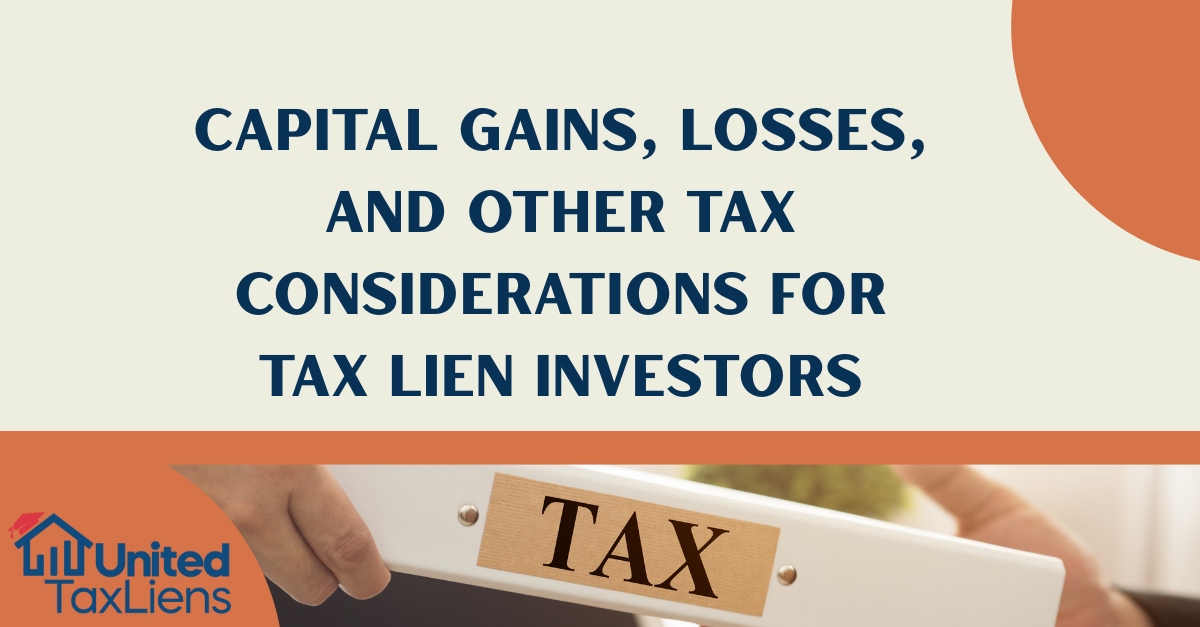Let’s say you’ve gone through the process, acquired a property through tax liens or a tax deed, and now you’re thinking about selling. Before you count up your profits, there’s one more thing to factor in: taxes.
We’re not tax pros (and this isn’t tax advice), but we do think it’s important for investors to have a basic understanding of how capital gains, and even losses, can affect the bottom line. Knowing what to expect before you sell can help you have smarter conversations with your tax professional and avoid some unpleasant surprises later.
Capital Gains: Timing Matters
If you sell a property for more than what you put into it, congratulations, you’ve made a profit! The IRS calls that a capital gain, and how much you owe in taxes depends largely on how long you’ve held the property.
- Sell within one year? That’s considered a short-term capital gain, and it’s usually taxed at your ordinary income rate. That means it could be as high as your regular tax bracket.
- Hold for more than a year? Now you’re in long-term capital gain territory, which often comes with a lower tax rate—potentially 0%, 15%, or 20%, depending on your income level.
That timing difference can make a noticeable dent in your net profits, so it’s worth thinking about your exit strategy with taxes in mind.
What If You Sell at a Loss?
It doesn’t always go perfectly. Sometimes a property sells for less than what you invested, especially after accounting for things like legal fees, cleanup costs, or necessary repairs.
In that case, you might have a capital loss. The good news? The IRS may allow you to use that loss to offset capital gains from other sales. And if your losses exceed your gains, you might even be able to deduct from your ordinary income, with any remainder carried forward into future years.
So while no one loves taking a loss, it can still offer some tax benefits if handled correctly.
Deductions to Keep on Your Radar
Even before the sale, there are a few other tax-related things worth thinking about. If you’ve invested in a property through a tax deed and you're putting money into it. Think; repairs, renovations, legal fees, or even property management. Some of those expenses may be deductible or may add to your property’s “basis,” which affects your final gain or loss calculation.
Common expenses investors might track include:
- Attorney fees related to the foreclosure process
- Improvements made to the property
- Interest on financing (if you borrowed money)
- Costs of selling the property (like agent fees or title transfers)
Again, the key here is to keep detailed records. You don’t want to be digging through receipts when it’s time to file. Clean records make it easier for your tax professional to calculate your liability and find legitimate deductions that could lower your tax bill.
Talk to the Pros
We’re all about helping people invest smarter. But when it comes to taxes, it’s best to team up with someone who lives and breathes IRS rules. A qualified tax advisor or CPA can help you:
- Calculate your capital gain or loss correctly
- Know what’s deductible (and what’s not)
- Structure your deals more efficiently moving forward
Taxes aren’t the fun part of investing but they can be the part that either protects or eats into your returns. A little planning can go a long way.
Bottom line?
If you’re making moves with tax deed properties, don’t forget to factor in the taxes. If you’re making moves with tax deed properties, don’t let taxes be an afterthought. A solid plan, and a good paper trail, can make all the difference when it’s time to cash in.
This blog is for informational purposes only and should not be relied upon as financial or investment advice. Real estate investing carries risks, and individual results will vary. Always consult with your team of professionals before making investment decisions. The authors and distributors of this material are not liable for any losses or damages that may occur as a result of relying on this information.



